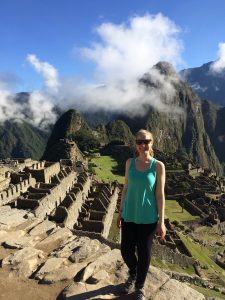Megan Ossmann '16 is using the skills she learned at Adelphi to protect parts of Long Island with the Town of Babylon Department of Coastal and Environmental Management.
The piping plover—the diminutive shorebird that is a staple of beaches along the East Coast, including Long Island’s iconic Jones Beach State Park—is in danger. Fortunately, Megan Ossmann ’16 is working to save the beloved bird and protect other parts of Long Island’s ecosystem in her new job as an environmental geographic information systems (GIS) analyst for the Town of Babylon Department of Coastal and Environmental Management.
Ossmann, a lifelong nature enthusiast, came to Adelphi to study environmental science. At Adelphi, she first learned about GIS—mapping software used to create visual representations of data—in a course, Mapping Environmental Issues, taught by Assistant Professor Brian Wygal, Ph.D. She was hooked.
Dr. Wygal hired her as a teaching assistant and later tipped her off about her current job.
“The skills I learned during the classes I took [at Adelphi] are essential for this job, and I have been building on these skills as I continue to use and learn the program,” Ossmann said.
She balances fieldwork and office work on multiple projects, such as assisting with inspections of storm-water violations, testing the water quality of the Great South Bay and mapping areas that are proposed for wetlands restoration. She is also mapping piping plover nesting sites in order to protect the endangered bird—a project that has led to some surprising experiences.
“The most interesting things happen on the beach when we are doing the plover work,” Ossmann said. “A few weeks ago, one of my co-workers found a message in a bottle from a 90-year-old woman looking for a pen pal, and so many funny, weird things that happen—it definitely keeps the job interesting!”
She feels that Adelphi prepared her well for her role.
“The lab and field classes I took at Adelphi, such as Marine Biology, Ecology and Observing Nature in the Field, prepared me for fieldwork, sharpened my observation skills and taught me how to record accurate and clear data, which is especially essential during the population surveys and piping plover work,” Ossmann said.

Megan Ossmann ’16 hiking the Inca Trail to Machu Picchu.
Ossmann’s summer hasn’t been all hard work. Right after graduation, she and her best friend, Alexandra Wurglics ’16, whom she met at Adelphi, traveled to Peru to hike the Inca Trail to Machu Picchu.
“We walked up and down thousands of steep stone stairs, wandered around 600-year-old ruins, hiked through cloud forests, camped in the middle of the mountains, met many amazing people and had so many experiences that we will never forget,” said Ossmann about their three weeks following the trail through Lima and Cuzco in Peru and the Amazon rainforest.
“I felt so connected to the site, to the trail, to the Incas who built it and to the countless number of people who have walked it before me,” Ossmann said. “I will definitely look back on this experience as one of my greatest challenges—physically, mentally and emotionally—but also one of my greatest accomplishments and one of the most breathtaking places I have ever seen.”
In addition to Dr. Wygal, Ossmann credits Beth Christensen, Ph.D., associate professor and director of the environmental studies program, who helped her discover her interests and passions through classes, lab work and research trips to the Virgin Islands and Australia.
See other stories in our After Adelphi series for 2016.For further information, please contact:
Office of University Communications and Marketing
p – 516.877.3693
e – ucomm@adelphi.edu